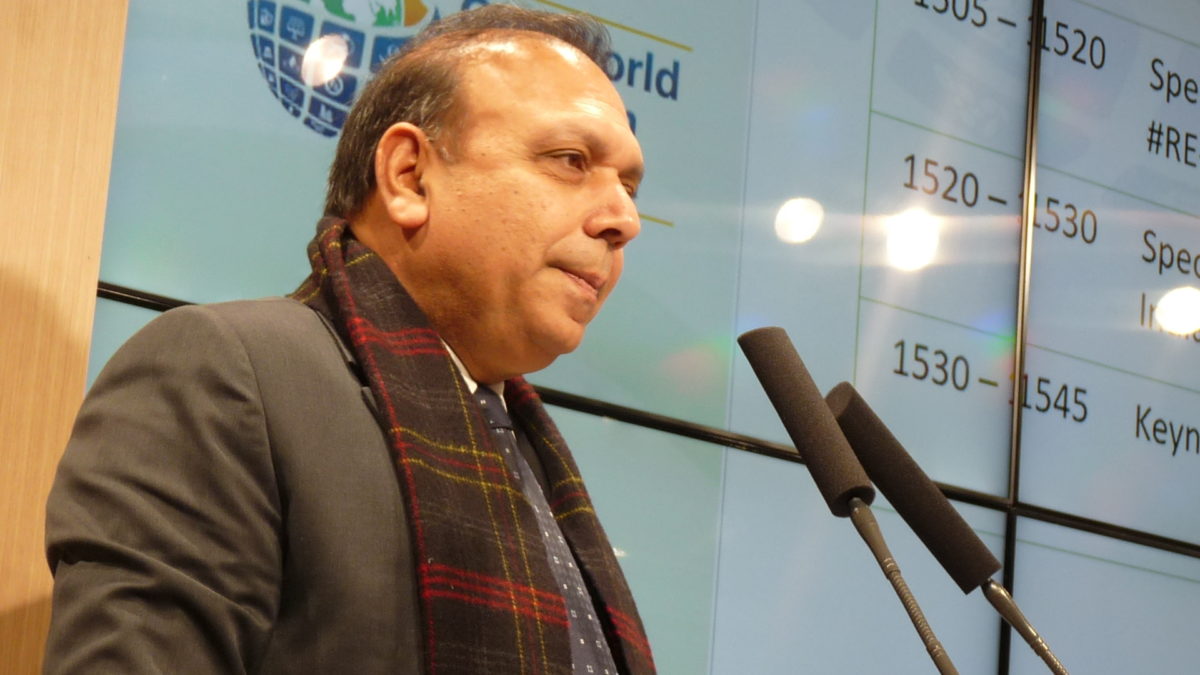The Ministry of New and Renewable Energy (MNRE) aims to provide Rs 10,000 crore to renewable energy developers, as well as project-specific funding for manufacturers.
In addition, the ministry said that it aims to provide export incentives of up to 6-8% to support the solar sector. It added that it will introduce a basic customs duty of 15%, when applicable, in a staggered manner to avoid hurting the interests of developers.
MNRE Secretary Anand Kumar recently explained that the government wants to maximize the availability of cash for solar developers. Kumar, who spoke as part of a recent online dialogue organized by the PHD Chamber of Commerce and Industry, claimed that India’s renewable energy target of 175 GW by 2022 was still very much within reach, with only 15 GW more left to bid before the close of the year.
“A renewable capacity of 35 GW is under various stages of installation, and another 33 GW is in the bidding stage,” he said. “That, together with the current installed capacity, takes us to a figure of 160 GW. So, only 15 GW more we have to bid out before the close of the year.”
Fund availability
The government is trying to increase the availability of funds for PV generators and developers by scrapping various duties, Kumar said.
“The ministry has devised a formula for paying the dues on account of safeguard duty,” he explained. “All such dues, along with goods and services tax (GST) and discom dues, would be paid to generators and developers immediately to enhance the capital available with them.”
The government also plans to set up a Rs 10,000-crore alternative investment fund with a government guarantee for discoms to make payments to developers and generators.
“Even today, as per the data compiled by [state-run lender] Indian Renewable Energy Development Agency (IREDA), we have Rs 12,000 crore as outstanding to RE developers and generators,” Kumar said. “We are planning to create an alternative investment fund with a government guarantee and raise Rs 10,000 crore. This amount will be given to discoms for payment to developers and generators.”
The MNRE said that earlier this year IREDA gave Rs 1,200 crore to the Rajasthan state government to cover payments to renewables developers, in response to complaints about four months of outstanding dues related to power discoms in the state.
To ensure that developers actually get their dues, the ministry will now ask state governments to provide details about the companies that will receive payments, Kumar said.
Hybrid power
The ministry has shifted from bidding for plain solar power to hybrid power, hybrid power with storage, peaking power, and round-the-clock supply.
“If we keep on supplying vanilla [plain] solar power or vanilla wind power to discoms, at one point of time solar power would be of no use to them because there is a different demand,” Kumar said. “Various discoms have different requirements for different RE products. Today, through [Solar Energy Corp. of India], MNRE is willing to supply products of different kinds.”
Export incentives
For the manufacturing sector, the government is trying to offer project-specific funding through IREDA.
“In this, if X party has bagged a manufacturing order from Y party, IREDA will give a loan to X party for the manufacturing, but the payment to IREDA will come from Y party,” Kumar explained. “So Y party commits to repaying the money for the project-specific funding.”
The minister said that Export-Import Bank of India (EXIM Bank) has agreed to provide loans to support exports. A request has also been made to the Ministry of Finance to raise export incentives from 2% to 6-8%, so that Indian manufacturers can start exporting their products.
In addition, the ministry is working out a staggered approach for levying the basic customs duty (BCD) on solar modules when it’s applicable to protect the interests of both the developers and the manufacturers.
“Post-Covid, we have a huge opportunity to set up solar cell and panel manufacturing capacity, as we import 80-85% of our requirement. We want to become self-sufficient,” said Kumar. “Toward this end, during this budget the Ministry of Finance has announced levying of 15% BCD on import of solar cells and inverters. We are working out a projectory for levying the BCD [when it’s applicable] so that we neither hamper the interests of the developers, nor the manufacturers. Maybe initially we will levy BCD at the rate of 1%, then at 5% after 1.5 years and 10-15% after three years.”
As the government looks at setting up the entire ecosystem for RE power, “the ministry has written to all state governments and various ports to identify land for creating manufacturing hubs, wherein land, power and finances are made available for manufacturing not only solar modules but also various ancillaries like batteries, glass, inverters and cables,” Kumar said.
In addition, the government sees a significant opportunity for small- and medium-sized enterprises players to export renewable-energy services.
“We want them to enter the export of RE services like operation and maintenance, and project designing. I have written to the Ministry of Commerce to allow us to set up an RE services export hub in Ahmedabad,” said Kumar.
This content is protected by copyright and may not be reused. If you want to cooperate with us and would like to reuse some of our content, please contact: editors@pv-magazine.com.









Hybrid solar should have been planned from the beginning. All the time the approach was on achieving the target not much on utility.
Even now mini grids in villages is a better option, by obtaining the cooperation of villagers. This will reduce the line losses and create work for villagers.